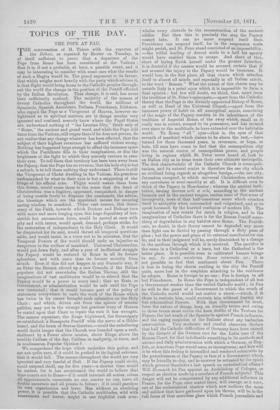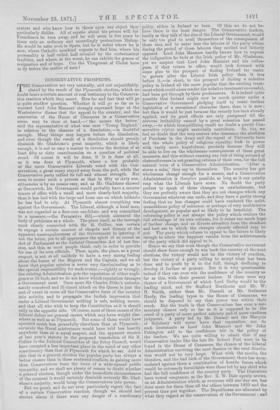TOPICS OF THE DAY.
THE POPE AT PAU.
THE conversation of M. Thiers with the reporter of the De'bats, as reported by Reuter on Tuesday, is of itself sufficient to prove that a departure of the Pope from Rome has been considered at the Vatican ;
that it is, if not a probable, at least, a possible event, and it may be interesting to consider with some care what the results of such a Hegira would be. The grand argument in its favour, that which weighs most heavily with the party which advises it, is that flight would bring home to the Catholic peoples through- out the world the change in the position of the Pontiff effected by the Italian Revolution. That change, it is said, has never been sufficiently realized. The majority of the masses of devout Catholics throughout the world, the millions of Spaniards, Spanish Americans, Italians, Frenchmen, Irishmen, who regard the Pope as a Vicegerent of Heaven, however en- lightened as to spiritual matters, are in things secular very ignorant and confused, scarcely know where the Papal States are, understand nothing of "the Leonine City," think only of "Rome," the ancient and grand word, and while the Pope still dates from the Vatican, still reigns there if he does not govern, do not realize that any change whatever has been effected, that the subject of their highest reverence has suffered violent wrong. Nothing has happened large enough to affect the immense space which the Pontificate fills in their imaginations, or dim the brightness of the light to which they scarcely venture to raise their eyes. To tell them that territory has been torn away from the Papacy, that the Pope has no revenue, that his holy city is but a suburb, is to tell them nothing they understand. There is still the Vicegerent of Christ dwelling in the Vatican, his grandeur undiminished by what to their eyes is but a snippeting of the fringe of his official robe. Flight would waken them from this dream, would rouse them to the sense that the head of Christendom was a fugitive, oppressed, vanquished, in danger of being unable freely to dispense the commands, the advice, the blessings which are the appointed means for securing saving wisdom to mankind, These vast masses, this demo- cracy of the Faith, towards which Doctors and Bishops turn with more and more longing eyes, this huge depositary of irre- sistible but unconscious force, would be moved at once with pity and with terror, would speak, demand, perhaps strike, for the restoration of independence to the Holy Chair. It would be disquieted for its soul, would thrust all temporal questions aside, and would insist, in a voice not to be mistaken, that the Temporal Powers of the world should undo an injustice so dangerous to the welfare of mankind. Universal Christendom would put down Italy, and after a year of ineffectual struggle the Papacy would be restored to Rome in all its former splendour, and with more than its former security from attack. Even if this did not happen in any dramatic way, if no Peter the Hermit stirred up a new Crusade, if the Italian populace did not overwhelm the Italian Throne, still the imaginations of vast multitudes would be so stirred that the Papacy would be a power in every land ; that no State, or Government, or administration would be safe until the Pope was contented ; that it would become part of the policy of statesmen everywhere to undo the work of the House which has twice in its career brought such calamities on the Holy Chair ; and which, driven out from the sphere of secular politics, may yet in the strange but gracious irony of Heaven be seated upon that Chair to repair the ruin it has wrought. The masses repentant, the Kings frightened, the Sovereignty re-established, a Bonaparte Pontiff with the nerve of a Hilde- brand, and the brain of Sextus Quintus,—could the unbelieving world doubt longer that the Church was founded upon a rock, sheltered by a Power above armies, above Kings, above the terrible Caliban of the day, Caliban in malignity, in force, and in soullessness, Popular Opinion ?
We comprehend the hope which underlies this policy, and are not quite sure, if it could be pushed to its logical extreme, that it would fail. The masses throughout the world are very ignorant and very fearful of Hell. If the Papacy could strike, could suspend itself, say for five years—a shorter time would be useless, for it has accustomed the world to believe that time counts not to Rome—if it could intermit all action, refuse all appointments, consecrate no one, answer no one, leave all doubts uncertain and all priests in fetters ; if it could paralyze its own. organization and leave Man without an absolving power, it is possible that the Catholic multitudes, wild with amazement and terror, might in one frightful rush over- whelm every obstacle to the reconstruction of the ancient. edifice. But then this is precisely the step the Papacy cannot take. It can no more suspend itself than Providence can suspend itself, for in the suspension souls. might perish, and St. Peter stand convicted of an impossibility,. —the wilful hurling of devout souls to a hell his agency would have enabled them to escape. And short of this,. short of laying Earth herself under the greater Interdict, it is doubtful if the masses would be aroused, certain that if" not aroused the injury to the Papacy would be immense. It would lose, in the first place, all that charm which attaches, itself in almost all minds, and especially in all Italian minds, to the word "Roman." What the extent of this charm may be outside Italy is a point upon which it is impossible to form a final opinion ; but few will doubt, we think, that, apart from the tradition of St. Peter's episcopate,—apart from the Catholic theory that the Pope is the divinely-appointed Bishop of Rome. as well as Head of the Universal Church,—apart from the. immense power of habit on all unseeptical minds, something of the magic of the Papacy consists in its inheritance of the tradition of Imperial Rome, of the sway which, small as it. really was in extent, seemed to its possessors, and has seemed ever since to the multitude, to have extended over the habitable world. To Rome " all " eyes—that is, the eyes of that seventh of mankind which claims to be above the rest,—have turned for three thousand years, in reverence, or hope, or hate, till men have come to feel that the cosmopolitan city was the natural centre of cosmopolitan power, and people living in regions which St. Peter never heard of, look to an Italian city as in some sense their own ultimate metropolis. The first characteristic of the Catholic Church is cosmopoli- tanism, and its natural centre is therefore the one city which no civilized being regards as altogether foreign,—the one city,. Jerusalem excepted, to which universal Christendom attaches. any sacredness or semi-sanctity at all. It is difficult even to think of the Papacy in Manchester ; whereas the ancient insti- tution, issuing decrees urbi et orbi, according to the ancient formula and in the ancient tongue, excites none of that sense of incongruity, none of that half-conscious scorn which attaches. itself to antiquity when surrounded and vulgarized, and so to, speak harassed, by the hurried confusion of modern life. The imagination of men counts for much in religion, and in the imaginations of Catholics there is for the Roman Pontiff some- thing of degradation in any habitat save Rome. The Pontifi- cate, no doubt, in their theory cannot be degraded, any more than light can be dirtied by passing through a dirty pane of glass ; but the power and grace of its external manifestation can be, and in their judgment will be, sorely diminished by a change in the medium through which it is received. The sacrifice is the same in a Cathedral or a barn, but the Cathedral is the better place. It is possible even to cultivated human beings to say, Lb seoula seculorunz Roma reverenda set; it is, not possible to feel that sentiment about Pau. There is loss in losing the charm residing in the city the Pontiff quits, more loss in the suspicion attaching to the residence he adopts. Rome is foreign to no one ; Pau is foreign to all but Frenchmen. In Rome the Pope is independent of all but a Government weaker than the united Catholic world ; in Pau he will be the guest of a Government to which the wrath of the Catholic world would not matter a straw,—which, if it, chose to restrain him, could restrain him without fearing any but schismatical Powers. With that Government he must, from the nature of things, keep on friendly terms, and owing to those terms must excite the keen dislike of the Teutons for France, the hot wrath of the Spaniards against French influence,. and the raging suspicion of the Italians about any barbarian intervention. Very moderate and careful observers declare that half the Catholic difficulties of Germany have been caused. by the distaste of the German race for the Latin tone of the Roman Court, for that indefinable something in its methods and axioms and daily administration with which a German, or Eng- lish, or American Pope would seem so incongruous; and how will it be when this feeling is intensified and rendered colourable by the powerlessness of the Papacy in face of a Government which may be friendly to-day, and to-morrow be actuated by the spirit which governs Gambetta's last speech on ecclesiastical affairs?' Will Bismarck let Pau appoint an Archbishop of Cologne, or respect an election made by a conclave of French subjects? This danger will not be compensated by any additional influence in France, for the Pope, once seated there, will emerge, as it were, out of the ecclesiastical shadow which now mellows the moss and mildew that have gathered upon his throne, will be in the full focus of that merciless glare which French journalists and orators and wits know how to throw upon any object they particularly dislike. All of mystic about his person will for Frenchmen be torn away, and he will seem in five years to them only an ordinary and exceedingly pretentious Bishop. He would be safer even in Spain, but he is safest where he is now, where Catholic mankind expects to find him, where his personality is half veiled, half revealed by the ecclesiastical tradition, and where, at the worst, he can exhibit the graces of resignation and of hope. Can the Vicegerent of Christ have to fly before the malice of men ?



































 Previous page
Previous page